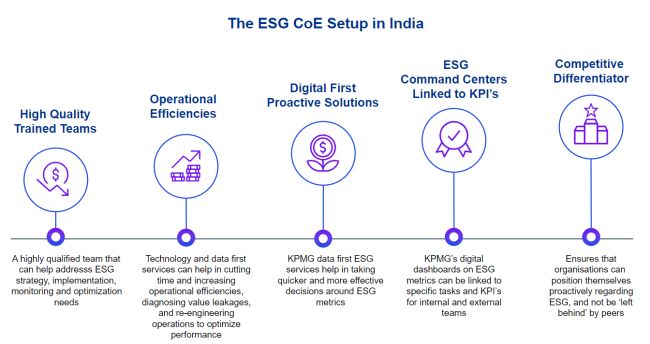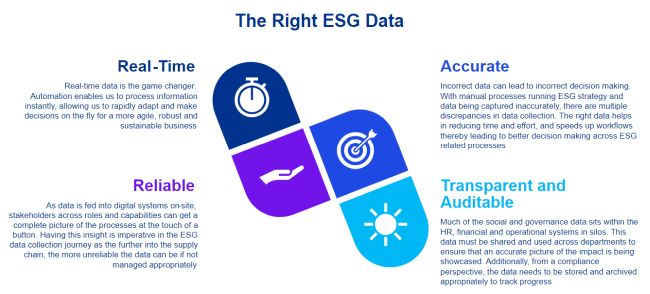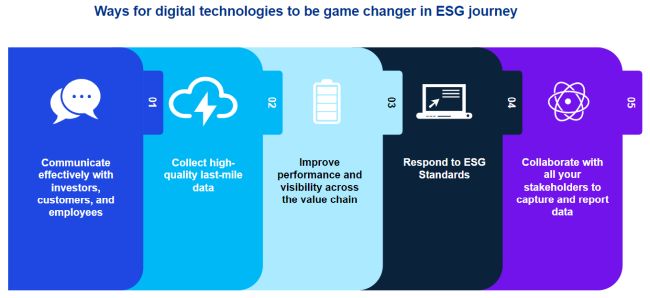In today's dynamic business landscape, the imperative to incorporate environmental, social and governance (ESG) considerations into corporate strategies has become increasingly apparent. As global awareness of climate change, social inequalities and ethical business practices grows, businesses are recognising that addressing ESG factors is not only a moral obligation, but also a strategic necessity all through the value chain. Embracing sustainability practices, fostering social responsibility, and upholding strong governance standards are integral components of contemporary business plans, ensuring long-term resilience and relevance in a world where stakeholders demand more than just financial success.
Global Capability Centres have the opportunity now to play a pivotal role in the overall ESG journey of a company.

There has been a significant contribution to the operational aspects of GCCs by functioning as a central nucleus of an enterprise. With its comprehensive perspective across the entire business spectrum, management of centralised cross-functional processes and systems, and custodianship of organisational data, GCCs are well-positioned to guide companies towards a more robust and sustainable trajectory. For instance, a global pharmaceutical manufacturer collaborated with their GCC organisation and digital technology group to analyse data from various business and functional processes supported by GCC. This analysis revealed opportunities for faster automation implementation across the organisation.
GCCs in India are on the path and aspire to be the innovation centre of excellence (CoE) for global organisations. They are well poised to drive technology initiatives in the ESG evolution and its governance. If designed with a central role and a ring-side view to organisation's operations and technology, GCCs can aid faster adoption of ESG strategy. As the world becomes increasingly reliant on data-driven technologies, it is imperative to pause and reflect on the intersection of data and the environment. Asking critical questions helps us navigate the complex landscape of data usage and its impact on our surroundings.
Leveraging its consolidated framework, geographical footprint, and data accessibility, GCCs can take the lead in advancing sustainability objectives through three key approaches:
1. Establish GCCs as a reliable ESG data source:
As custodians of vast operational and financial data, GCC can play a vital role in ensuring accuracy and availability of information for ESG reporting, and beyond. Instead of viewing environmental data as a regulatory obligation, businesses should embrace it as a strategic asset capable of driving innovation and fostering sustainable growth. By delving into the insights provided by environmental data, organisations can identify operational inefficiencies, uncover opportunities for resource optimisation and innovate products and services with a reduced ecological footprint. This shift towards proactive use of environmental data goes beyond meeting regulatory requirements; it becomes a catalyst for organisational evolution, paving the way for a business landscape where sustainability is not just a goal but an inherent part of every strategic decision.

2. Leverage technology to transform global business:
GCC capabilities can be utilised to monitor, adapt and drive business decisions using various types of ESG tech and data practices. IoT technology, along with digital twins and other capabilities, has the potential to revolutionise ESG strategies by providing real-time, data-driven insights into a company's sustainability practices. From tracking digital assets, to real-time energy monitoring of GCC facilities, companies can make informed decisions to improve their ESG performance and build stakeholder trust, in real-time.

Moreover, GCC's role in monitoring emerging ESG trends, regulatory shifts, competitive benchmarks, best practices, and technological advancements can equip the organisation to anticipate future reporting demands and adapt methods accordingly.
3. Transforming into green GCCs:
GCC resources can prove highly effective in real-time tracking and reporting of critical actions and high-level statuses to organisational leaders. GCCs can efficiently compile and disseminate status reports that vividly showcase progress concerning the organisation's commitments, and their own current carbon footprint. In essence, the sustainability of a company hinges on the GCC' ability to integrate environmentally conscious practices into their daily operations. From supply chain transparency to energy efficiency, these business units have the potential to drive systemic change, fostering a culture of responsibility that positively impacts the environment and the company's long-term viability.
Originally published by KPMG India Blog, 14 February 2024
The content of this article is intended to provide a general guide to the subject matter. Specialist advice should be sought about your specific circumstances.

